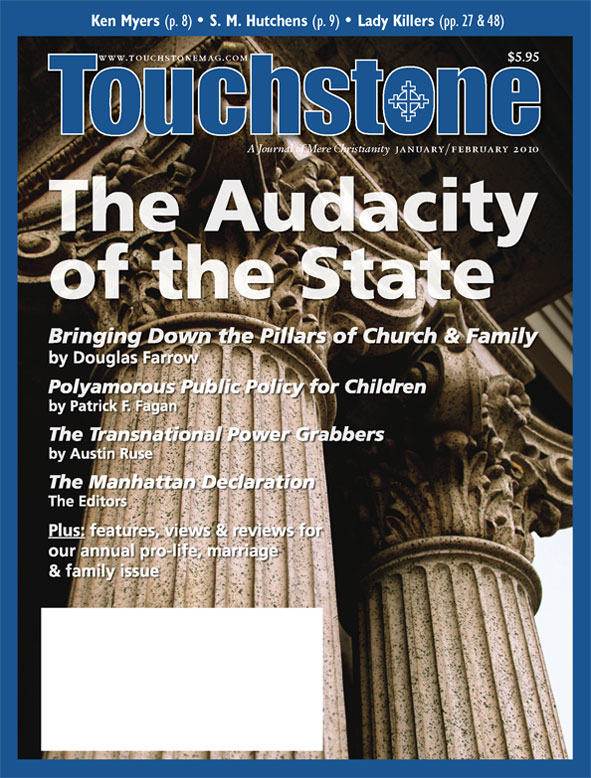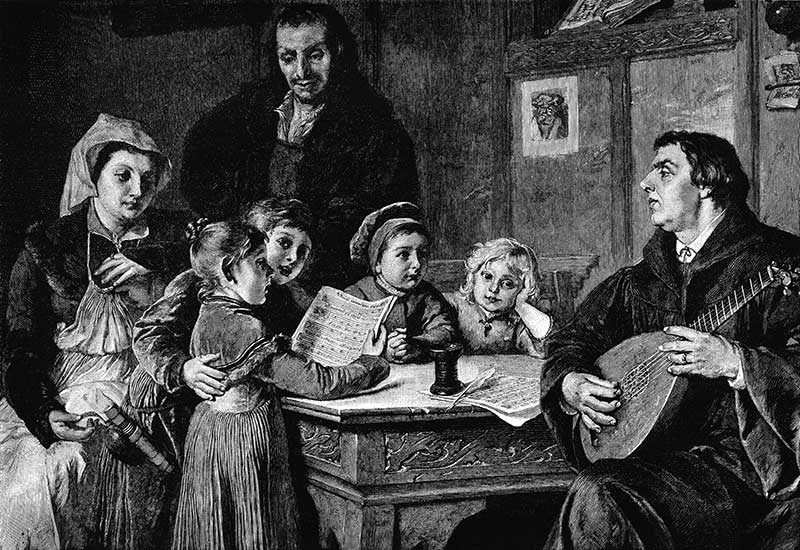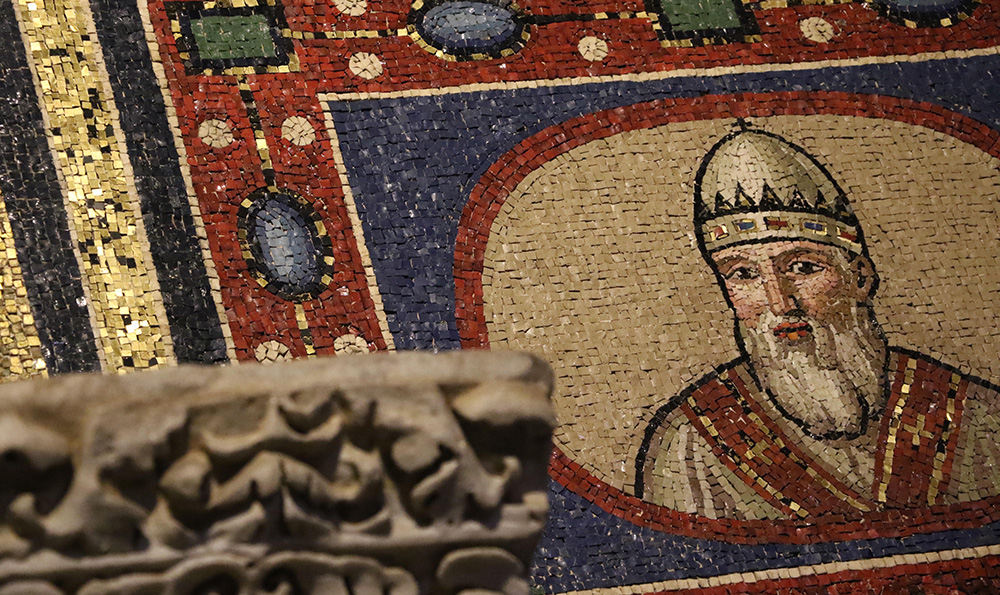Feature
The Audacity
of the State
It’s Bent on Bringing Down the House on the Family & the Church
by Douglas Farrow
Jeremiah Wright’s 1990 sermon, “The Audacity to Hope,” which lent Barack Obama the title of his electioneering book, has the story of Hannah as its text, and a painting by G. F. Watts as its foil. Whether the lecture at which Wright first heard of the painting, or his own subsequent reading, included a consultation of G. K. Chesterton’s 1904 treatment of Watts, I can’t say. But Chesterton writes of Watts as follows:
Those who know the man himself, the quaint and courtly old man who is still living down at Limnerlease, know that if he has one trait more arresting than another, it is his almost absurd humility. He even disparages his own talent that he may insist rather upon his aims. His speech and gesture are simple, his manner polite to the point of being deprecating, his soul to all appearances of almost confounding clarity and innocence. But although these appearances accurately represent the truth about him, though he is in reality modest and even fantastically modest, there is another element in him, an element which was in almost all the great men of his time, and it is something which many in these days would call a kind of splendid and inspired impudence. It is that wonderful if simple power of preaching, of claiming to be heard, of believing in an internal message and destiny: it is the audacious faculty of mounting a pulpit. [ G. F. Watts, 1904]
The Reverend Wright and President Obama certainly have the courage to mount a pulpit and preach. They, too, show a certain “inspired impudence,” albeit not of a Victorian variety. Obama’s rhetoric in particular strikes me as lacking any underlying modesty or humility. But then our present political condition is one of immodesty, not least where the state is in view, which is why I have somewhat impudently turned the title of Obama’s book back upon itself.
The Savior State
When I speak of the audacity of the state, the kind of state I have in mind is what we may call the savior state. The main characteristic of the savior state is that it presents itself as the people’s guardian, as the guarantor of the citizen’s well-being. The savior state is the paternal state, which not only sees to the security of its territory and the enforcement of its laws but also promises to feed, clothe, house, educate, monitor, medicate, and in general to care for its people. Some prefer to call it the nanny state, but that label fails to reckon with its inherently religious character. The savior state does have a religious character, precisely in its paternalism, and may even be comfortable with religious rhetoric.
We are familiar with such rhetoric from ancient times. Was Caesar not soter? Did his coinage not mark him out as divi filius and pontifex maximus? “This, this is he,” says Anchises in Virgil’s Aeneid, the one you’ve been waiting for—“the man you have heard promised to you so often, Augustus Caesar, son of a god, who will once again establish the Golden Age in Latium, in the region once ruled by Saturn.”

We are familiar with it from modern times too. The savior state is the kind of state that Hobbes envisioned, or that Louis Du Moulin had in mind when he said that “the Commonwealth is a visible church.” It is the kind of state that emerges when it is assumed, as Herbert Thorndike pointed out in objection to both “Hobbism and Independency,” that “a man may be heir to Christ’s kingdom and endowed with Christ’s Spirit without being, or before he be, a member of God’s church.” It is the kind of state that Obama had in mind when, during the presidential campaign, he invited a Christian audience in South Carolina to see him as “an instrument of God” and to help him “create a Kingdom right here on Earth.” Presumably it is the kind of state Dorothy Cotton had in mind when she penned her new gospel ditty:
Tell me, tell me, why was Obama born?
Tell me, tell me, why was Obama born?
Somebody had to inspire our youth
Somebody had to hear every voice
Somebody had to tell the truth
That’s why Obama was born, my lordy,
That’s why Obama was born.
A single verse—there are five others—suffices, I think, to make the point.
Douglas Farrow is Professor of Theology and Ethics at McGill University in Montreal. His recent books include Ascension Theology, Desiring a Better Country, Theological Negotiations, and 1 & 2 Thessalonians in the Brazos Theological Commentary on the Bible. He is a senior editor of Touchstone.
subscription options
Order
Print/Online Subscription

Get six issues (one year) of Touchstone PLUS full online access including pdf downloads for only $39.95. That's only $3.34 per month!
Order
Online Only
Subscription

Get a one-year full-access subscription to the Touchstone online archives for only $19.95. That's only $1.66 per month!
bulk subscriptions
Order Touchstone subscriptions in bulk and save $10 per sub! Each subscription includes 6 issues of Touchstone plus full online access to touchstonemag.com—including archives, videos, and pdf downloads of recent issues for only $29.95 each! Great for churches or study groups.
Transactions will be processed on a secure server.
more on family from the online archives

31.5—September/October 2018
Errands into the Moral Wilderness
Forms of Christian Family Witness & Renewal by Allan C. Carlson
more from the online archives
calling all readers
Please Donate
"There are magazines worth reading but few worth saving . . . Touchstone is just such a magazine."
—Alice von Hildebrand
"Here we do not concede one square millimeter of territory to falsehood, folly, contemporary sentimentality, or fashion. We speak the truth, and let God be our judge. . . . Touchstone is the one committedly Christian conservative journal."
—Anthony Esolen, Touchstone senior editor













